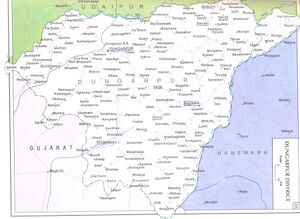Dungarpur


Dungarpur (डूंगरपुर) is a city and district in the southernmost part of Rajasthan. The rail line between Udaipur and Himatnagar in Gujarat runs through the town, shortest distance to the National Highway 8 from Dungapur town is 20 km. The town of Dungarpur is named after Dungaria, an independent Bhil chieftain who was assassinated by Rawal Bir Singh.[1] Dungarpur was expanded in 1282 AD by Rawal Veer Singh Dev. Rawal Veer Singh Deo initiated the construction of this palace in Vikram Samvat (Hindu Calender) in 1939 on Kartik Shukla Ekadashi. After realizing the importance of this palace, his son Rawal Bhuchand transferred the capital of Dungarpur State to this palace. Since then, this palace became the centre of all the activities of Dungarpur State. The construction of this palace could only be completed in eighteenth century after laying the foundation stone in thirteenth century.
History
Historical heritage of Dungarpur is very rich. Much research needs to be done to establish and confirm ancient history of Dungarpur. The history of Dungarpur is well documented after the arrival of Parmars of Malwa in this region.
The descendants of ruler of Mewar took control of this region in 12th century AD. Towards the end of 12th century, Samant Singh the elder son of the ruler of Mewar paved way for his younger brother Kumar Singh to become the ruler of Mewar. Samant Singh himself left claim to the kingdom of Mewar and came to this hilly region of Vagad and in the next century his successors took control of whole region of vagad.
But between 1183-84 Chalukya king of Gujrat Bhimdev II removed Samant Singh from Vagad and made Amritpal Dev the King of Vagad. Amritpal Dev belonged to the Bhartrapatta branch of Guhil dynasty.
Between 1209-1218 Jayat Singh somehow managed to regain control of some parts of Vagad lost by his father Samant Singh and then between 1218-1248 Sinhad Dev, son of Jayat Singh won the Capital Baroda by his own bravery. His son Jai Singh added Arthuna during 1248-1251.
Rawal of Mewar Jaitra Singh sent Madan of Talaraksh family to help Rawal Jai Singh for the Arthuna Battle. Madan showed extraordinary bravery in that battle. His younger brother Devpaldev captured Galiyakot from Parmars during 1251-78. His son Veer Singh Dev captured the area known as Dungarpur today and surrounding areas also from Bhil Chieftan Dungariya Bhil.
Ideal time for tourists to visit Dungarpur is between July and March.
Tahsils in Dungarpur district
Villages in Dungarpur tahsil
Amjhara, Amliya Fala, Andar Khet, Antarsuwa, Antri Dungarpur, Ariwat, Asela, Asiya Bao, Bagbol, Bagdari, Baiyora, Baka Khara Beer, Baladeetmafi, Baldiya, Balota, Balwara, Bandighati, Bandra, Bantabalgun, Bara Hathai, Barod, Baron Ka Sher, Baroti With Chak, Bassi, Beekasor, Beelri, Berniya, Bhachariya, Bhagal Salawatan, Bhandariya With Chak, Bharatpur, Bhatpur, Bhatra, Bhatwara, Bhehan Beri, Bhehana, Bhilwata, Bhojaton Ka Ora, Bhuwali, Bichhiwara, Bilpan, Bokhla, Bor Ka Pani, Bor Ka Talab, Bori, Bubela, Chak Mahuri With Chak I & II, Chandrawasa, Chela, Chhapi, Chundawara With Chak, Dabela, Dachki @ Jaswantpura, Dadoriya, Dakanmariya, Damri, Damuni, Dara, Dedakon Ka Wela, Dedli, Deoli, Devpura, Devsomnath, Dewalkhas, Dhamala, Dhamlat Falan, Dhamod, Dhani Ghatau, Dhani Hathai, Dharma Odi, Dhawari, Dhuwaliya, Doja, Dolwar Nichali, Dolwar Upli, Dolwariyon Kaora, Dovra, Dudheli Ka Bhatra, Dungarpur (M), Faloj, Galandar, Gamri Ahara, Gamri Dewal, Gara Malji, Garamoraiya, Garda, Garduna, Gehuwara, Genji, Ger, Geruwara, Gesuon Ka Wanga, Gharmala, Ghata With Chak, Ghatau, Ghooghra, Gokal Pura, Gumanpura, Gumanpura, Harmatiya, Hathai, Hathor, Heeratan, Himmatpur, Himmatpura, Hingori, Jagabor, Jamboori, Jelana, Jhalan, Jhaloo Kua, Jhankol, Jhapa, Jheejwa With Chak, Jogiwara, Jura, Kala Pana, Kaloo Gamra, Kandula, Kanhari Chak -A, Kanhari Chak -B, Kankra Dara, Kanpur, Kanwa, Kaparwel, Karauli, Kesar Pura, Khajoori, Khajooriya, Khaparda, Khara, Khemaroo, Khempur, Khera Kachwasa, Khera Pal, Kheri, Kherwara, Kherwara, Kherwara Seedri, Khumanpura, Kodiyagun, Kol Khanda, Kotana, Kubera, Kundli, Kunwaliya Dara, Kushal Magri, Laxmanpura, Laxmanpura, Lehana, Lolakpura With Chak, Lorwara, Mahdwa With Chak I & II, Mahipal Pura, Majhola, Makreda, Mali Khera, Malmatha, Malpur (Rural), Mana Talai, Mandwa Bhera Bhai (Bari), Mandwa Biyola, Mandwiya, Manipur, Manpur, Mara, Margiya Mahura, Mathu Gamra, Metali, Mewara, Modar, Mokarwara, Moth, Nala, Nalwa, Nan Ka Nala, Nareli, Narniya, Nawa Gaon, Nawa Tapran, Nawagaon Farras, Nawaghara, Nawal Shyam, Naya Gaon, Nayagaon Punali, Nejpur, Ojri, Oontiya, Ora Bara, Ora Chota, Orwariya, Padardi, Padardi, Padardiahara, Pagara, Pakhroon, Pal Kol Khanda, Pal Mahuri, Palbassi, Paldewal, Palgamri, Pali Sora With Chak Palmandav, Palmathu Gamra, Palpadar, Palwara, Panthal, Paora, Parda Chaubisan, Parda Gokaliya, Parda Moru, Patli, Patri, Peethapur, Phooti Talai, Pipalada, Punali, Punrawara, Ragela, Raghunath Pura, Rajgarhi, Rama, Rampur, Rampur Biyola, Ramsagra, Rangela, Ransagar Pachor, Rata Pani, Ratanpur, Ratanpura, Ratnawara, Relra, Renta, Rohan Wara, Rojela, Sabli, Salampura, Samota, Samota Kaora, Sanchiya, Sara, Saram, Sarkan Kopcha With Chak, Sarkan Sai, Sati, Satora, Satu, Savgar, Seemal Ghati, Selaj, Semaliya, Sendwai, Shishod, Shivpura, Siyal Dari, Sulai, Sundarpur, Surpur, Talaiya, Talaiyan, Tariobri, Teejwar, Tengar Wara, Thaiyata, Thana, Toraniya, Undarda, Upar Gamiya, Upargam, Vagdari, Vajarda, Vaje Pura, Vasuwa, Vedawara, Veeri With Chak, Veerpur, Veerpur With Chak Vikas Nagar, Wada Punali, Watra, Wer,
Places to see
- Udai Bilas Palace
- Juna Mahal or the Old palace
- Shrinathji temple
- Government Archaeological Museum
- District Librery
- Shri Adinatha Jain Swetamber Temple
- Beneshwar Dham
- Rokadia Ganesh Temple
- Saraneshwar Temple
External Links
Notable persons
Dungarpur village in Faridabad, Haryana
Dungarpur is also the name of a village in tahsil and district Faridabad of Haryana.
References
- ↑ Encyclopædia Britannica Eleventh Edition, 1911
Back to Rajasthan

